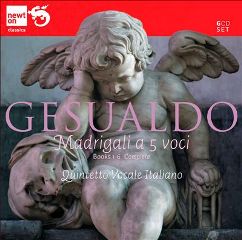Gesualdo da Venosa - Madrigali a 5 Voci Libro V (2012)
Gesualdo da Venosa - Madrigali a 5 Voci Libro V (2012)

[1] Gioite voi col canto [2] S'io non miro non moro [3] Itene, o miei sospiri [4] Dolcissima mia vita [5] O dolorosa gioia [6] Qual fora donna [7] Felicissimo sonno [8] Se vi duol il mio duolo [9] Occhi del mio cor vita [10] Languisce al fin [11] 'Merce', grido piangendo [12] O voi, troppo felici [13] Correte, amanti, a prova [14] Asciugate i begli occhi [15] Tu m'uccidi, o crudele [16] Deh, coprite il bel seno [17] Poiche l'avida sete [18] O tenebroso giorno [19] Se tu fuggi, io non resto [20] 'T'amo, mia vita' Quintetto Vocale Italiano: Karla Schlean soprano Clara Foti mezzo-soprano Elena Mazzoni contralto Rodolfo Farolfi tenor Gastone Sarti baritone Dmitri Nabokov bass Angelo Ephrikian – director
Even if the extraordinary style Gesualdo achieved in his late madrigals had no influence on the course of music, it remains a major creative achievement. One of the key elements of that style, first fully heard in the fifth book of madrigals, is a percussive, gestural, use of harmony. His new harmony is made up of an unpredictable tendency to chromaticism, and the use of prepared and unprepared dissonances. At important points this is in fact used as a percussive element in the music. No other western composer would do this again in any significant way until the twentieth century. Harmony as percussion is an important compositional technique, springing from the fundamental conditions of musical sound. It is due to social/cultural considerations rather than inherently musical ones that we still receive harmony as percussion with shy ears. Gesualdo's early discovery of the technique should make us realize this.
One issue that is still left open to debate, however, is whether or not Gesualdo's adventurings were based on clear harmonic perception. Was he biting off more chromaticism than he could chew? It seems to depend on which performances you listen to, for if nothing else Gesualdo's music is difficult to handle well, no less because his Renaissance aristocrat's sensibility is so remote. But opinion has turned generally in his favor. Instead of exaggerating the musical significance of his personal neuroses, it's now understood that as a composer at least, he wasn't crazy. Quite the opposite: he was calculating, and coldly, fiercely competitive. Working among madrigalists in Ferrara who were experimenting along the exact same lines as he, he heard exactly how far his contemporaries had gone, were likely to go, and deliberately went further.
As with all great madrigalists, Gesualdo's stylistic choices can be understood as a result of zeal for bringing out the spirit of the text. Gesualdo avoids in Book 5 all clichéed, banal madrigalisms, such as having the bass fall to an extremely low note on a word like "inferno." Every illustrative idea he uses is an original thought, every moment so carefully and deliberately composed it's amazing to consider the sheer energy that went into each madrigal. But Gesualdo's most radical characteristic, that he shared with Luca Marenzio, is not his use of harmony, but his total abandonment of the ideal of smooth polyphonic flow. The music constantly twists and turns and changes radically. It is feverish, intense, totally Italian. And in his labyrinthine musical corridors, we often stumble on nasty harmonic surprises, set in waiting like booby-traps. Through conservative, skillful voice-leading, effective use of rhythmic contrasts (a very underrated factor in the music), and sectional repetitions, those harmonic surprises are made horribly impressive. Without the music's conservative elements, and his uncanny mastery of the total effect of a piece, these madrigals would disintegrate. Instead, by a miraculous coincidence of factors, they are unusually whole. Gesualdo's experiments were a "dead end" because he was an impossible act to follow. ---Donato Mancini, Rovi
download (mp3 @320 kbs):
uploaded yandex 4shared mega mediafire solidfiles zalivalka cloudmailru oboom








